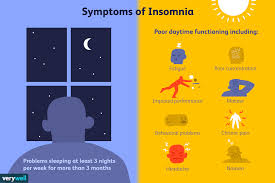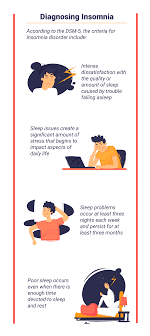Effective Treatment for Acute Insomnia
Acute insomnia, characterized by difficulty falling or staying asleep for a short period of time, can be a frustrating and disruptive condition. While it is often triggered by stress, anxiety, or significant life events, there are effective treatment options available to help individuals overcome acute insomnia and improve their sleep quality.
Behavioral Therapy
Behavioral therapy is a common and effective treatment for acute insomnia. This approach focuses on changing behaviors and habits that may contribute to sleep difficulties. Techniques such as stimulus control, sleep restriction, and relaxation training can help individuals establish a healthy sleep routine and improve their ability to fall asleep and stay asleep.
Cognitive Behavioral Therapy (CBT)
Cognitive Behavioral Therapy (CBT) is another proven treatment for acute insomnia. CBT addresses the underlying thoughts and beliefs that may be contributing to sleep disturbances. By challenging negative thought patterns and developing coping strategies, individuals can learn to manage stress and anxiety more effectively, leading to improved sleep quality.
Sleep Hygiene Practices
Practicing good sleep hygiene is essential for managing acute insomnia. This includes establishing a consistent sleep schedule, creating a relaxing bedtime routine, optimizing the sleep environment, avoiding stimulants like caffeine close to bedtime, and engaging in regular physical activity during the day. These practices can promote better sleep quality and help regulate the body’s natural sleep-wake cycle.
Medication Options
In some cases, healthcare providers may recommend short-term use of medication to treat acute insomnia. Common medications include over-the-counter sleep aids or prescription medications that help promote relaxation and improve sleep onset. It is important to consult with a healthcare professional before starting any medication regimen to ensure safety and effectiveness.
Conclusion
Acute insomnia can be a challenging condition to navigate, but with the right treatment approach, individuals can overcome sleep difficulties and restore their natural sleep patterns. By incorporating behavioral therapy, cognitive behavioral therapy, practicing good sleep hygiene habits, and considering medication options when necessary, individuals can effectively manage acute insomnia and enjoy restful nights of rejuvenating sleep.
Top 9 Benefits of Acute Insomnia Treatment for Better Sleep and Well-Being
- Effective in addressing short-term sleep difficulties
- Can improve overall sleep quality
- Helps individuals establish healthy sleep habits
- Addresses underlying causes of insomnia
- Reduces reliance on medication for sleep aid
- Promotes relaxation and stress management
- Enhances cognitive function and daytime performance
- May prevent chronic insomnia from developing
- Customizable treatment options based on individual needs
Challenges in Treating Acute Insomnia: Time, Side Effects, Costs, Discomfort, and Variable Success
- Treatment may require significant time and effort to see noticeable improvements in sleep quality.
- Some treatment options for acute insomnia, such as medication, may have potential side effects.
- Accessing certain therapies, like cognitive behavioral therapy, may be costly and not covered by insurance.
- Individuals may experience initial discomfort or resistance when implementing behavioral changes recommended for treatment.
- Success of treatment for acute insomnia can vary depending on individual factors and underlying causes of sleep disturbances.
Effective in addressing short-term sleep difficulties
Effective acute insomnia treatment approaches are particularly beneficial in addressing short-term sleep difficulties. By providing targeted interventions and strategies to improve sleep quality and address underlying causes of insomnia, individuals experiencing short-term sleep disturbances can find relief and restore their natural sleep patterns. These treatments offer practical solutions and support to help individuals overcome acute insomnia quickly and effectively, promoting better rest and overall well-being.
Can improve overall sleep quality
One significant benefit of treating acute insomnia is its potential to improve overall sleep quality. By addressing the underlying causes of sleep disturbances and implementing effective treatment strategies such as behavioral therapy, cognitive behavioral therapy, and sleep hygiene practices, individuals can experience a positive shift in their sleep patterns. Improved sleep quality can lead to better restorative sleep, increased daytime alertness, enhanced cognitive function, and overall well-being. Prioritizing the treatment of acute insomnia can ultimately result in a more restful and rejuvenating night’s sleep, contributing to better physical and mental health outcomes.
Helps individuals establish healthy sleep habits
One significant benefit of acute insomnia treatment is its ability to assist individuals in establishing healthy sleep habits. Through behavioral therapy, cognitive behavioral therapy, and sleep hygiene practices, individuals can learn and implement strategies that promote a consistent sleep schedule, create a relaxing bedtime routine, optimize their sleep environment, and avoid behaviors that disrupt sleep. By cultivating these healthy sleep habits, individuals can improve their overall sleep quality and enhance their ability to fall asleep and stay asleep naturally.
Addresses underlying causes of insomnia
One significant benefit of acute insomnia treatment is its ability to address the underlying causes of sleep disturbances. By targeting the root factors contributing to insomnia, such as stress, anxiety, or lifestyle habits, treatment approaches like behavioral therapy and cognitive behavioral therapy can help individuals identify and address the specific triggers affecting their sleep quality. This proactive approach not only provides immediate relief from sleep difficulties but also equips individuals with long-term strategies to manage and prevent future episodes of acute insomnia.
Reduces reliance on medication for sleep aid
One significant benefit of treating acute insomnia is that it can reduce the reliance on medication for sleep aid. By addressing the underlying causes of sleep disturbances through behavioral therapy, cognitive behavioral therapy, and sleep hygiene practices, individuals can improve their ability to fall asleep naturally and maintain a healthy sleep routine without the need for medication. This approach not only promotes long-term sustainable improvements in sleep quality but also minimizes the potential risks and side effects associated with prolonged use of sleep medications.
Promotes relaxation and stress management
One significant benefit of acute insomnia treatment is its ability to promote relaxation and improve stress management. By addressing sleep disturbances through behavioral therapy, cognitive behavioral therapy, or other treatment modalities, individuals can learn techniques to calm the mind and body, leading to a more relaxed state conducive to better sleep. Managing stress effectively plays a crucial role in overcoming acute insomnia, as reducing anxiety levels and promoting relaxation can help individuals achieve restful and rejuvenating sleep patterns.
Enhances cognitive function and daytime performance
Effective treatment of acute insomnia not only addresses sleep difficulties but also offers the significant benefit of enhancing cognitive function and daytime performance. By improving sleep quality and quantity, individuals experiencing acute insomnia can experience better concentration, memory retention, problem-solving abilities, and overall mental clarity during waking hours. This enhancement in cognitive function leads to improved productivity, mood regulation, and overall performance in daily activities, ultimately contributing to a better quality of life.
May prevent chronic insomnia from developing
Effective treatment of acute insomnia may prevent the development of chronic insomnia. By addressing sleep difficulties early on and implementing strategies to improve sleep quality, individuals can avoid the progression of occasional sleep disturbances into a more persistent and severe condition. Early intervention through behavioral therapy, cognitive behavioral therapy, and sleep hygiene practices can help individuals establish healthy sleep habits and effectively manage stress and anxiety that may contribute to insomnia. By taking proactive steps to address acute insomnia, individuals can reduce the risk of long-term sleep problems and maintain a restful and rejuvenating sleep routine.
Customizable treatment options based on individual needs
One significant advantage of treating acute insomnia is the availability of customizable treatment options tailored to individual needs. This personalized approach recognizes that each person may experience insomnia differently and have unique underlying factors contributing to their sleep difficulties. By offering a range of treatment modalities, such as behavioral therapy, cognitive behavioral therapy, sleep hygiene practices, and medication options, healthcare providers can work with individuals to develop a treatment plan that addresses their specific challenges and preferences. This individualized approach not only enhances the effectiveness of treatment but also empowers individuals to take an active role in managing their insomnia and improving their overall sleep quality.
Treatment may require significant time and effort to see noticeable improvements in sleep quality.
One notable con of treating acute insomnia is that the process may demand a substantial investment of time and effort before individuals can experience noticeable improvements in their sleep quality. Implementing behavioral therapy, cognitive behavioral therapy, and adopting good sleep hygiene practices often require consistent dedication and patience to yield significant results. This extended timeframe for seeing improvements can be challenging for individuals seeking quick relief from their sleep difficulties, requiring them to stay committed to the treatment plan despite not seeing immediate changes in their sleep patterns.
Some treatment options for acute insomnia, such as medication, may have potential side effects.
Some treatment options for acute insomnia, such as medication, may have potential side effects. While medication can be effective in helping individuals manage sleep difficulties, it is important to consider the possible risks and adverse reactions that may accompany its use. Common side effects of sleep medications can include drowsiness, dizziness, dependence, and cognitive impairment. Additionally, some medications may not address the underlying causes of insomnia and could lead to long-term reliance on pharmaceutical interventions. It is essential for individuals to weigh the benefits and drawbacks of using medication for acute insomnia treatment and consult with healthcare professionals to explore alternative approaches that minimize potential side effects.
Accessing certain therapies, like cognitive behavioral therapy, may be costly and not covered by insurance.
Accessing certain therapies, such as cognitive behavioral therapy, for the treatment of acute insomnia can pose a significant challenge due to cost implications and insurance coverage limitations. Cognitive behavioral therapy is a highly effective approach for addressing sleep disturbances, but its expense may deter individuals from seeking this beneficial treatment option. Unfortunately, many insurance plans do not fully cover the costs of cognitive behavioral therapy sessions, leaving patients to bear the financial burden themselves. This lack of accessibility to affordable therapies highlights a notable con in the treatment of acute insomnia, potentially hindering individuals from receiving optimal care and support for their sleep-related issues.
Individuals may experience initial discomfort or resistance when implementing behavioral changes recommended for treatment.
When addressing acute insomnia treatment through behavioral changes, individuals may encounter a con in the form of initial discomfort or resistance. Adjusting ingrained habits and routines can be challenging, leading to feelings of discomfort or reluctance to adopt new behaviors. This resistance may stem from the unfamiliarity of the recommended changes or the perceived difficulty in breaking existing patterns. Overcoming this hurdle requires patience, persistence, and a willingness to embrace change, as these initial discomforts are often temporary obstacles on the path to improving sleep quality and overall well-being.
Success of treatment for acute insomnia can vary depending on individual factors and underlying causes of sleep disturbances.
The success of treatment for acute insomnia can vary depending on individual factors and the underlying causes of sleep disturbances. Factors such as overall health, stress levels, lifestyle habits, and mental well-being can all play a role in how effectively an individual responds to treatment. Additionally, the specific triggers of acute insomnia, whether it be temporary stressors or underlying medical conditions, can impact the effectiveness of interventions. It is important for healthcare providers to tailor treatment plans to address the unique needs and circumstances of each individual experiencing acute insomnia in order to maximize the chances of successful outcomes.



